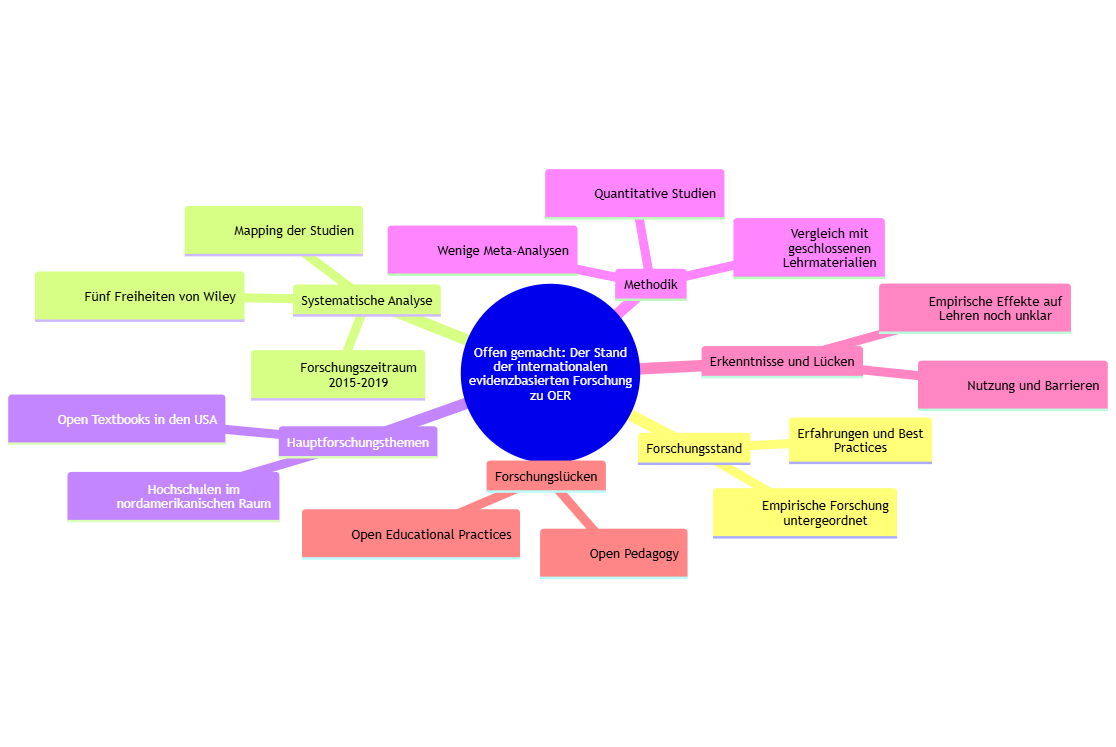
 Bildung-Alt-Entfernen
Bildung-Alt-Entfernen BldgAltEntf E059: Schülies
Die Folge haben wir am 04.11.2024 aufgenommen.
Intro & Feedback
- Danke an Mathias für die ausführliche Kommentierung der letzten Folge. Wir empfehlen auch seinen Blogartikel zum (Un-)sinn von KI-Richtlinien an Hochschulen.
- LNP 505 zur Elektronischen Patientenakte
Zum Mitspielen:
News+Alt+Entf
News+O
- Marc Rebillet im Hamburger Stadtpark (Wikipedia, YouTube)
- Halbmarathon in Hamburg, Marathon in Berlin
- O arbeitet an einigen Neuigkeiten rund um H5P
- Nach Norwegen mit dem Flixbus, zurück mit Covid
News+A
- BarCamp Lübeck in Vorbereitung, Anmeldung läuft
- Tag der Lehre in Lübeck mit Keynote von Doris Wessels
- Das Projekt DiSEA ist abgeschlossen, Tutorial-Kurs für Lehrende und Studienberatung
- EduCamp Calberlah, das nächste ist vom 21. bis 23.03.2025 Essen
- Der Digital Learning Campus steht in den Startlöchern.
- Freibeutermukke ist cool
Paper+Alt+Entf
Paper+O: Ohne Titel
Kakish, Shereen; Makhamreh, Zeyad; Madanat, Reem
The Post-Pandemic Future of Digital Learning Artikel
In: Ubiquitous Learning: An International Journal, Bd. 18, Ausg. 1, S. 201–217, 2024, ISSN: 1835-9795.
@article{Kakish2024,
title = {The Post-Pandemic Future of Digital Learning},
author = {Shereen Kakish and Zeyad Makhamreh and Reem Madanat},
url = {https://doi.org/10.18848/1835-9795/CGP/v18i01/201-217},
doi = {10.18848/1835-9795/CGP/v18i01/201-217},
issn = {1835-9795},
year = {2024},
date = {2024-10-04},
journal = {Ubiquitous Learning: An International Journal},
volume = {18},
issue = {1},
pages = {201–217},
abstract = {The challenges faced by universities in higher education after the COVID-19 pandemic necessitate the adoption of new tools and practices to maintain student engagement and motivation in alternative teaching methodologies beyond traditional face-to-face learning environments. H5P, an interactive learning tool renowned for its diverse interactive content features, emerges as a promising solution to address these needs. This article discusses the findings of implementing H5P in various courses within the French and Geography departments at the University of Jordan. Data collection involved pre- and post-surveys administered via Moodle and H5P, focusing on student perceptions of H5P features. The study results indicate that both H5P and Moodle can significantly enhance the effectiveness of e-learning. The application of H5P not only facilitated instructional improvements but also personalized learning across five courses. This approach broadened learning opportunities, bolstered student support, and fostered increased engagement. Students who interacted with these resources reported positive experiences and expressed a desire for more interactive elements in future coursework. Furthermore, H5P’s interactive and engaging nature contributed to a more enjoyable and effective learning journey, thereby sustaining student motivation throughout their studies.},
keywords = {},
pubstate = {published},
tppubtype = {article}
}
Paper+A: Methodisch Inkorrekt
Haddaway, Neal R.; Bethel, Alison; Dicks, Lynn V.; Koricheva, Julia; Macura, Biljana; Petrokofsky, Gillian; Pullin, Andrew S.; Savilaakso, Sini; Stewart, Gavin B.
Eight problems with literature reviews and how to fix them Artikel
In: Nature Ecology & Evolution, Bd. 4, S. 1582–1589, 2020, ISSN: 2397-334X.
@article{Haddaway2020,
title = {Eight problems with literature reviews and how to fix them},
author = {Neal R. Haddaway and Alison Bethel and Lynn V. Dicks and Julia Koricheva and Biljana Macura and Gillian Petrokofsky and Andrew S. Pullin and Sini Savilaakso and Gavin B. Stewart},
url = {https://doi.org/10.1038/s41559-020-01295-x},
doi = {10.1038/s41559-020-01295-x},
issn = {2397-334X},
year = {2020},
date = {2020-10-12},
journal = {Nature Ecology & Evolution},
volume = {4},
pages = {1582–1589},
abstract = {Traditional approaches to reviewing literature may be susceptible to bias and result in incorrect decisions. This is of particular concern when reviews address policy- and practice-relevant questions. Systematic reviews have been introduced as a more rigorous approach to synthesizing evidence across studies; they rely on a suite of evidence-based methods aimed at maximizing rigour and minimizing susceptibility to bias. Despite the increasing popularity of systematic reviews in the environmental field, evidence synthesis methods continue to be poorly applied in practice, resulting in the publication of syntheses that are highly susceptible to bias. Recognizing the constraints that researchers can sometimes feel when attempting to plan, conduct and publish rigorous and comprehensive evidence syntheses, we aim here to identify major pitfalls in the conduct and reporting of systematic reviews, making use of recent examples from across the field. Adopting a ‘critical friend’ role in supporting would-be systematic reviews and avoiding individual responses to police use of the ‘systematic review’ label, we go on to identify methodological solutions to mitigate these pitfalls. We then highlight existing support available to avoid these issues and call on the entire community, including systematic review specialists, to work towards better evidence syntheses for better evidence and better decisions.},
keywords = {},
pubstate = {published},
tppubtype = {article}
}
Fundgrube+Alt+Entf
Projekte, Tools, Apps… das sind doch bürgerliche Kategorien. Wir packen einfach alles in die Fundgrube:
- Paperpanda bitte nicht nutzen
- EduBuchKlub initiiert von Nele Hirsch und Gabi Fahrenkrog
- Podcasts (alle Podcast-Empfehlungen auf fyyd)
- Bytes und Bildung
- Schreiben und Schreddern von und mit Marc-Uwe Kling, Empfehlung zum Reinhören: Episode mit Inka und Markus Brand
- Puppkultur, “Der Podcast mit Stoff und Herz” von Martin Reinl (Jan von Jan & Henry) und Julian Schlichting
Politik+Alt+Entf
- PDF to Podcast via NotebookLM, Bericht bei Matthias Kindt
- Andreas Sexauer: KI-generierte Zusammenfassungen und Analysen in Veranstaltungen: praktische Erfahrungen und Empfehlungen zum Nachmachen
- Mermaid: Markdown-ähnliche Sprache für Diagramme, Mindmaps etc.

Mindmap zum Paper aus der letzten Episode
Veranstaltungstipps
- O war bereits auf dem Buch-Release von Jörans neuem Buch „Digitale Zusammenarbeit 4.0 – die Gebrauchsanleitung!“ in zwei Bänden.
- 08. November 2024: Grand Opening des DLC-Lernorts Lübeck
- 08. & 09. November 2024: NOOK Lübeck
- 11. bis 15. November 2024: Woche der KI in Lübeck
- 18. bis 20. November 2024: OERcamp Essen
- 29. & 30. November 2024: BarCamp Lübeck
- 27. bis 30. Dezember 2024: 38c3 in Hamburg
Weltverbesserung+Alt+Entf
bildung.social hat derzeit etwa ein Defizit von 100 € im Monat, hier geht es zu den Spenden-Optionen.
Diese und andere Weltverbesserungsideen findet man auch gesammelt hier.
